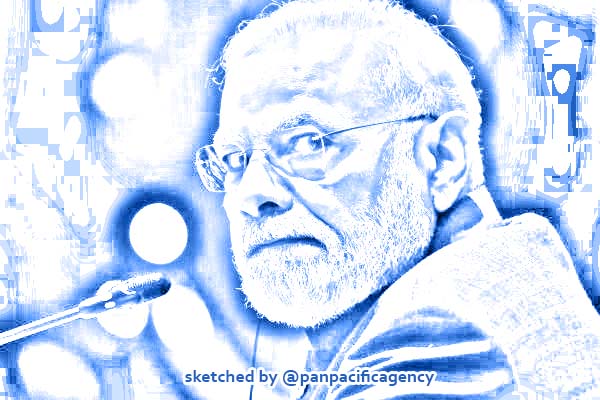At India, EU summit high-level dialogue set up to address trade issues

India's Prime Minister Narendra Modi looks on at the ASEAN-India Summit on the sideline of the 35th ASEAN Summit in Bangkok, Thailand, 3 November 2019 (Photo: Reuters/Athit Perawongmetha). Sketched by the Pan Pacific Agency.
NEW DELHI, Jul 15, 2020, One India. India and the 27-nation European Union on Wednesday decided to set up a high-level dialogue to enhance trade and investment and iron out lingering differences over the long-pending free trade agreement, while vowing to expand their overall ties in areas like defence, nuclear energy and health, during a virtual summit, One India reported.
Narendra Modi at EU summit Reflecting growing congruence in ties, the two sides also unveiled a five-year roadmap for further boosting their strategic partnership, announced institution of a separate maritime dialogue and released a declaration on moving towards a more circular economic model. Secretary (West) in the External Affairs Ministry Vikas Swarup said India’s relations with China did come up in the talks and Prime Minister Narendra Modi shared New Delhi’s views on the ties as well as also on the current situation in the border areas.
Pakistan’s continued support to terrorist activities against India and other countries of the region too figured in the talks. In his opening remarks, Prime Minister Narendra Modi stressed on greater cooperation between democratic nations to deal with the new problems that have cropped up globally in the economic field after COVID-19.
On trade ties, Swarup said the two sides have expressed their commitment and agreed to work for a balanced, ambitious and mutually beneficial trade agreement and that talks on it may start in the next few months. Launched in June 2007, negotiations for the proposed Broad-based Trade and Investment Agreement (BITA) have witnessed many hurdles as both sides have major differences on crucial issues. The negotiations on the pact has been stalled since 2013.
At a press conference, Swarup said Modi emphasised on the priority that India attaches to attracting foreign direct investment and continued efforts of his government to liberalise the regulatory environment. Modi said ‘Aatmanirbhar Bharat’ (self-reliant India) initiative is aimed at integrating domestic production in India to global supply chains.
A joint statement issued after the talks said the high-level dialogue on trade and investment will aim at fostering progress on the trade and investment agreements, addressing trade irritants and improving conditions for traders and investors on both sides as well as discuss supply chain linkages.
“The leaders agreed to further develop their trade and investment relations to unleash their full potential particularly in the context of post-COVID-19 economic recovery and support sustainable growth and jobs on both sides,” it said. Asked whether human rights issues in the context of Jammu and Kashmir and Citizenship Amendment Act figured in the talks, Swarup said it was mentioned by the EU side and that they expressed the faith in Indian institutions in addressing them. On terrorism, the two sides reaffirmed their strong commitment to combat terrorism in all its forms and manifestations, including its financing, and countering radicalisation.
The two sides also welcomed the launch of negotiations on a working arrangement between the Central Bureau of Investigations and Europol to support law enforcement authorities of India and the member states of the EU in preventing and combating organised crime and terrorism. Prime Minister Modi, in his inaugural remarks, also pitched for bringing out an “action-oriented” agenda to further expand ties between the two sides within a stipulated time frame.
The prime minister said he was committed to enhance ties with the grouping, noting that a long-term strategic perspective should be adopted to boost the relationship. “India and the EU are natural partners. Our partnership is also useful for peace and stability in the world. This reality has become even more evident in today’s global scenario,” he said.
“Both sides share universal values like democracy, pluralism, inclusivity, respect for international institutions, multilateralism, freedom and transparency. After COVID-19, new problems have cropped up globally in the economic field. This requires greater cooperation between the democratic nations,” he added.
Modi also talked about “variety of pressures” on the rules-based international order, adding the India-EU partnership can play a significant role in economic reconstruction, and in building a human-centric and humanity-centric globalisation.
In the roadmap 2025, the two sides vowed to work together to maintain peace, stability, safety and security in the Indian Ocean as well as in the Pacific, by cooperating to preserve freedom, openness and an inclusive approach in the maritime domain.
The document listed a number of areas like outer space, health and food security, research and innovation, trade and investment, clean energy and environment among the areas for expansion of ties. The joint statement said the leaders confirmed their full support to an open, free, stable and secure cyberspace, and their commitment to foster the responsible and liable behaviour of all the actors in the cyberspace. It said India and the EU will continue to cooperate on international and regional issues of common interest including Iran and Afghanistan.